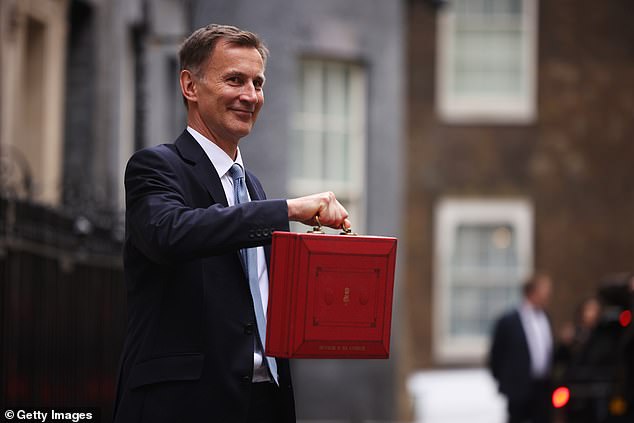Jeremy Hunt put growth front and centre of his Spring Budget today – with a commitment to cut tax and make work pay.
As predicted, the Chancellor sliced 2p off National Insurance for the second time in four months and held out the prospect of more personal reductions to come.
But in spite of his efforts to spike Labour guns by abolishing non-dom tax status for wealthy foreign residents and levying fresh taxes on second homes, there was not nearly enough to make any significant dent in the Conservatives’ dire showing in the polls.
The Prime Minister’s last best hope is to engineer further tax cuts before the general election expected later this year.
Hunt had very little room for manoeuvre this time round thanks to strict rules designed to help keep the financial markets onside after the trauma of Liz Truss’s aborted tax-cutting premiership in the autumn of 2022.
Nevertheless, for the first time in recent memory, he invoked the mantra that lower taxes produce more revenues. This ought to be a statement of the obvious from a Tory – but it’s a truism that has been largely ignored in recent times as the vast costs of the 2008 financial crisis, the pandemic (£370billion alone) and helping Ukraine combat Russia’s invasion have piled up.

Jeremy Hunt today, before delivering a Budget in which he had little room for manoeuvre
Part of his limited wiggle room has come from shifting economic forecasts. The doom and gloom projected by the Bank of England, the Office for Budget Responsibility and much of the broadcast media is being increasingly challenged.
With the economy projected to grow by 0.8 per cent this year and an even more encouraging 1.9 per cent in 2025, the shallow ‘blip’ recession seen at the end of last year should soon be a thing of the past.
And if the Treasury’s record is anything to go by, even these forecasts could be swiftly upgraded.
Two of the great drivers of Britain’s economy, the housing market and the services sector, are already gathering strength.
Optimism in construction is at its highest level for six months amid signs of an upturn and, even more importantly, services – which account for almost 80 per cent of the nation’s output – are surging, with the future of IT and consultancy looking brighter than at any time in the past two years.
The Chancellor also revealed a dramatic improvement in the outlook for inflation, which has put intense pressure on many household budgets in recent months.
The annual rise in consumer prices is set to drop to 2.2 per cent this year (close to the Bank of England’s 2 per cent target) from a peak of 9.1 per cent in 2022. This easing in the cost of living crisis will be welcomed but it may be too late in the electoral cycle for the public to give the Government the benefit of the doubt.
On the plus side, it does mean the governor of the Bank of England Andrew Bailey should be in a position to start cutting the interest rate from its current level of 5.25 per cent by the summer – a move that will help to reduce the cost of mortgages.

The 2p cut in National Insurance is the second such reduction in four months
As part of the effort to bolster output and deliver Britain from despondency, the Chancellor also offered tax incentives and financial help to Britain’s fast-growing tech, life sciences and creative sectors.
A special mention was given to AstraZeneca, the UK’s world-leading pharmaceutical company, which has agreed to invest another £650million in Cambridge and Liverpool.
In an effort to reinvigorate investment in UK-listed companies, Hunt also unveiled the ‘British ISA’. This will allow citizens to invest a further £5,000 tax-free in UK funds to support good domestically owned companies, which have been under siege recently from overseas buyers and private equity barons.
Meanwhile, the £3.5billion investment in new tech for the flailing NHS may make great strides towards boosting productivity and outcomes in our overstretched Health Service. The downside is that such reforms take years to have a meaningful impact.
The bitter truth for Hunt is that, in spite of a valiant effort to bolster output and growth, his measures will take a long time to banish the public perception that the Conservatives have done a rotten job and public services are falling apart. And time is one thing he is running out of.



